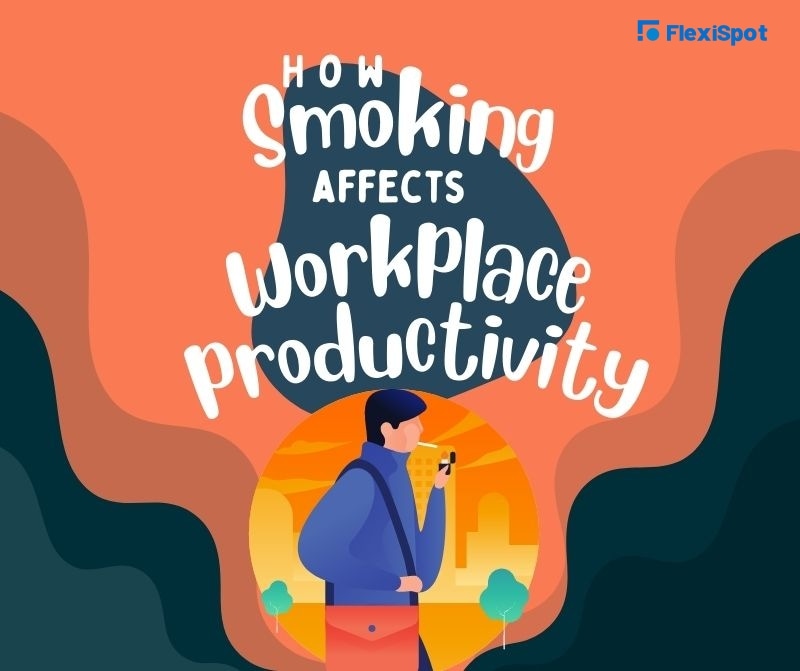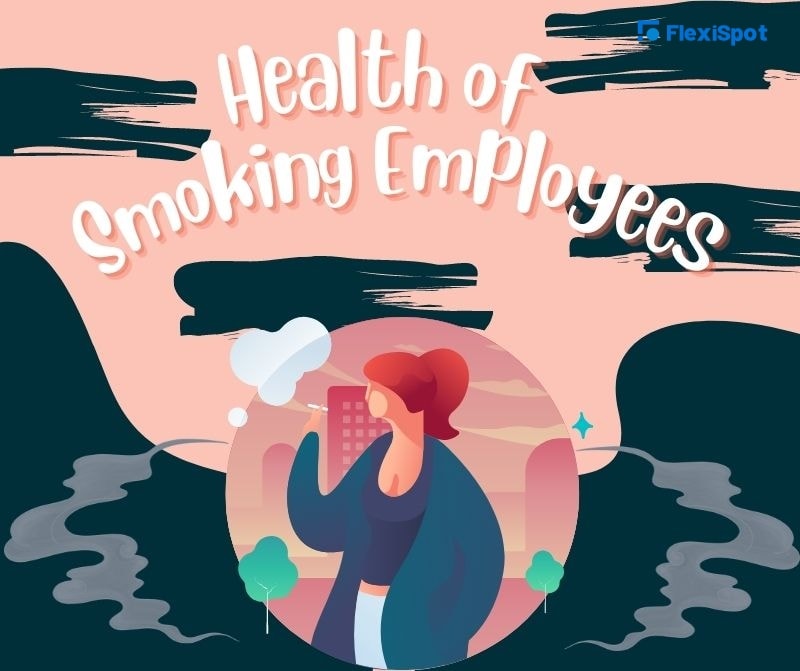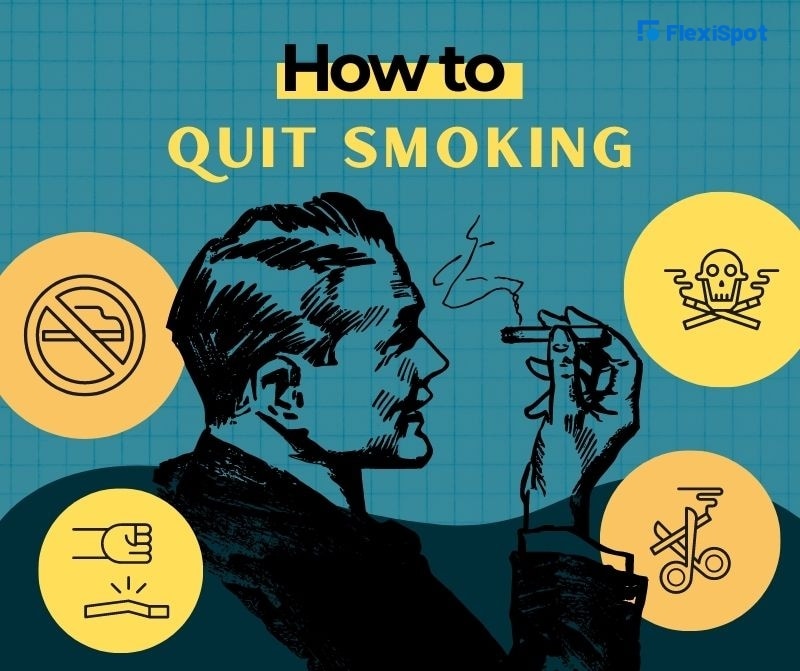It’s important to stay healthy if you want a long, happy, and fulfilling life.
Most people, however, get lured to try vices or are encouraged to indulge in one by the social circles they are with. One such vice is smoking. It is a common cause of terminal illnesses yet so many still smoke or find it hard to quit because of addiction. Many say that it helps relieve them off their stress so for instance, in an office, people use their work breaks to have a smoke.

Not everyone knows though that smoking also has an adverse effect on one's productivity. Below are some reasons as to how and why it will affect your productivity at work:
1. You will take more and longer breaks.
When you are addicted to smoking, you will be longing for it every now and then. This means you will frequently go out for a smoke break and be less productive.
2. Smoking increases anxiety and reduces concentration.
According to Indus Health, smoking can raise anxiety levels making you focus less on what you need to work on.
3. Smoking exposes nonsmokers to its dangers.
If you are a smoker and are always with your loved ones, you will expose them to second-hand smoke. This directly impacts their health as well even though they are not smokers themselves.
4. Smoking has the potential to cause the destruction of the workplace culture.
Smoking can cause the division of smokers and nonsmokers in an office. It can build cliques and even cause favoritism in some cases, for example, your superior and co-worker smoke together and talk about their ideas for a project during smoke breaks.
5. Smokers are at a higher risk for accidents, injuries, and illnesses.
Because smoking badly affects one’s health, smokers are more prone to diseases and call off sick to work.
6. There will be additional cleaning costs when there are smokers in the workplace.
Maintaining a clean workplace will entail more effort in an office with many smokers.
7. Smokers are more likely to go for early retirement because of poor health.
Since smoking is bad for the health, smokers have higher chances to develop a terminal disease which might mean early retirement.
What this means for employers is that they will have to bear the indirect additional cost caused by smoking.
What Smoking Does to the Health of Smoking Employees
1. Smoking may cause stroke and coronary heart disease.
Over time, chain-smokers may suffer from a heart disease.
2. Blood vessels could be damaged through smoking.
The chemicals in the smoke that comes from cigarettes cause the swelling and inflammation of blood vessels. This means the blood vessels can be narrowed and may develop a cardiovascular condition.
3. Smoking causes lung cancer.
According to the CDC, cigarette smoking is linked to around 80 to 90% of deaths caused by lung cancer in the United States. It’s no doubt the number one cause why people suffer from a terminal disease.
4. Smoking can trigger and worsen an asthmatic condition.
Smoking can cause irritation of the airways which causes them to swell, narrow down, and be filled with mucus. This could cause an asthma flare-up or attacks.
5. For men, smoking can cause erectile dysfunction. For women, fertility can be reduced. If pregnant, smoking can cause disabilities in babies.
Not a lot of people know smoking’s effects on one’s fertility. When you smoke while trying to get pregnant or when pregnant, you could cause fertility problems for yourself and your partner.
6. Smoking is a factor that causes Type 2 diabetes.
The more you smoke in a day, the higher the risk of developing diabetes as an adult. Nonsmokers have fewer chances of getting diabetes.
7. Smoking can lead to memory reduction, poor planning, and degradation of mental ability—sometimes even causing dementia.
According to Alzheimer’s Research UK, smokers are 30% more likely to have dementia and 40% more likely to develop Alzheimer’s disease.
How to Quit Smoking
To reiterate, smoking has the potential to also cause health problems for your loved ones. It’s a hard habit to break once you get addicted and attached to it but it doesn’t mean you can’t. It’s a conscious choice to say no to smoking and to finally quit after years of addiction. Here are some steps you could do to quit this unhealthy vice:
1. Mark a quit date in the calendar.
Take it slowly. Maybe you can cut off the number of cigarettes you smoke in a day. You could also cut off the days you smoke in a week. The important thing is to have a final date when you'll smoke.
2. Tell others that you plan to quit.
Get the word out and let your family, friends, and fellow employees know that you are making an important health decision of quitting your smoking habit for good. They could be your support system to stop smoking and help you get through this tough transition. Ask them to be firm with you and to not invite you for work breaks so it will be easier to follow through with your commitment.
3. Plan how you’ll face the challenges once you stop smoking.
Most people return to smoking after three months. If you don’t want this to happen, prepare ahead and have a solution in a plan for challenges you will encounter.
4. Discard all cigarette products at home.
Make cigarettes inaccessible to you. Get rid of all the lighters, matches, ashtrays, and cigarettes so that you won’t be tempted. You should also wash your clothes, car seats, bed sheets, furniture fabric—anything that reeks of smoke so that you won’t be tempted for a puff.
5. Ask for help from your doctor on how you could quit smoking.
Your doctor can give you a prescription to help you deal with withdrawal symptoms. There are also over-the-counter products that can help you quit smoking altogether. These include lozenges, gum, and nicotine patches.
Employee Health Program
To help you on your path to quitting smoking, join a smoking cessation program at work. You can always join the health programs your company offers to employees.
Companies show that they value the health of their employees by investing in ergonomic furniture, offering health insurance coverage plans, setting up health seminars, and organizing fun fitness activities. At the end of the day, the employee has the last say as to how he or she will take care of his or her health.

